|
PLearn 0.1
|
|
PLearn 0.1
|
Learner that trains several sub-learners on 'bags'. More...
#include <BaggingLearner.h>
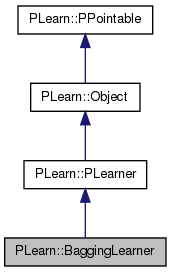
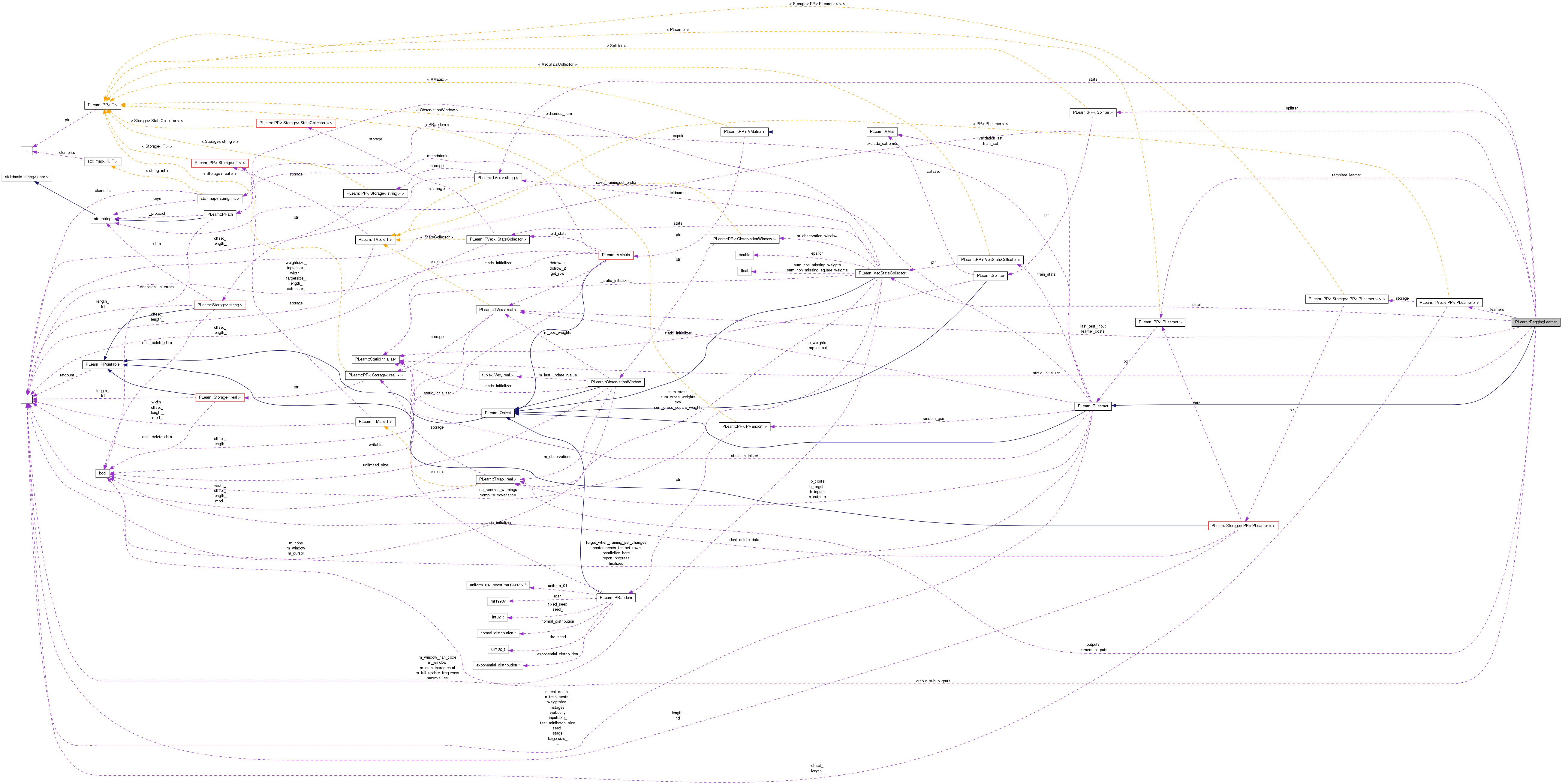
Public Member Functions | |
| BaggingLearner (PP< Splitter > splitter_=0, PP< PLearner > template_learner_=0, TVec< string > stats_=TVec< string >(1,"E"), int exclude_extremes_=0, bool output_sub_outputs_=false) | |
| Default constructor. | |
| virtual int | outputsize () const |
| SUBCLASS WRITING: override this so that it returns the size of this learner's output, as a function of its inputsize(), targetsize() and set options. | |
| virtual void | forget () |
| *** SUBCLASS WRITING: *** | |
| virtual void | train () |
| *** SUBCLASS WRITING: *** | |
| virtual void | computeOutput (const Vec &input, Vec &output) const |
| *** SUBCLASS WRITING: *** | |
| virtual void | computeCostsFromOutputs (const Vec &input, const Vec &output, const Vec &target, Vec &costs) const |
| *** SUBCLASS WRITING: *** | |
| virtual TVec< std::string > | getTestCostNames () const |
| *** SUBCLASS WRITING: *** | |
| virtual TVec< std::string > | getTrainCostNames () const |
| *** SUBCLASS WRITING: *** | |
| virtual int | nTestCosts () const |
| Caches getTestCostNames().size() in an internal variable the first time it is called, and then returns the content of this variable. | |
| virtual int | nTrainCosts () const |
| Caches getTrainCostNames().size() in an internal variable the first time it is called, and then returns the content of this variable. | |
| virtual void | resetInternalState () |
| If any, reset the internal state Default: do nothing. | |
| virtual bool | isStatefulLearner () const |
| Does this PLearner has an internal state? Default: false. | |
| virtual void | setTrainingSet (VMat training_set, bool call_forget=true) |
| Declares the training set. | |
| virtual TVec< string > | getOutputNames () const |
| Returns a vector of length outputsize() containing the outputs' names. | |
| virtual void | setTrainStatsCollector (PP< VecStatsCollector > statscol) |
| Sets the statistics collector whose update() method will be called during training. | |
| virtual string | classname () const |
| virtual OptionList & | getOptionList () const |
| virtual OptionMap & | getOptionMap () const |
| virtual RemoteMethodMap & | getRemoteMethodMap () const |
| virtual BaggingLearner * | deepCopy (CopiesMap &copies) const |
| virtual void | build () |
| Finish building the object; just call inherited::build followed by build_() | |
| virtual void | makeDeepCopyFromShallowCopy (CopiesMap &copies) |
| Transforms a shallow copy into a deep copy. | |
| virtual void | setExperimentDirectory (const PPath &the_expdir) |
| The experiment directory is the directory in which files related to this model are to be saved. | |
Static Public Member Functions | |
| static string | _classname_ () |
| static OptionList & | _getOptionList_ () |
| static RemoteMethodMap & | _getRemoteMethodMap_ () |
| static Object * | _new_instance_for_typemap_ () |
| static bool | _isa_ (const Object *o) |
| static void | _static_initialize_ () |
| static const PPath & | declaringFile () |
Public Attributes | |
| PP< Splitter > | splitter |
| splitter used to get bags(=splits) | |
| PP< PLearner > | template_learner |
| to deep-copy once for each bag | |
| TVec< string > | stats |
| functions used to combine outputs from all learners | |
| int | exclude_extremes |
| for computeOutput: remove the highest and lowest outputs before averaging (nb. | |
| bool | output_sub_outputs |
| Wether computeOutput should append sub-learners outputs to output. | |
Static Public Attributes | |
| static StaticInitializer | _static_initializer_ |
Protected Member Functions | |
| TVec< string > | addStatNames (const TVec< string > &names) const |
Static Protected Member Functions | |
| static void | declareOptions (OptionList &ol) |
| Declares this class' options. | |
Protected Attributes | |
| TVec< PP< PLearner > > | learners |
| VecStatsCollector | stcol |
| Mat | learners_outputs |
| Mat | outputs |
| Vec | learner_costs |
| Vec | last_test_input |
Private Types | |
| typedef PLearner | inherited |
Private Member Functions | |
| void | build_ () |
| **** SUBCLASS WRITING: **** | |
Learner that trains several sub-learners on 'bags'.
Definition at line 51 of file BaggingLearner.h.
typedef PLearner PLearn::BaggingLearner::inherited [private] |
Reimplemented from PLearn::PLearner.
Definition at line 53 of file BaggingLearner.h.
| PLearn::BaggingLearner::BaggingLearner | ( | PP< Splitter > | splitter_ = 0, |
| PP< PLearner > | template_learner_ = 0, |
||
| TVec< string > | stats_ = TVec<string>(1,"E"), |
||
| int | exclude_extremes_ = 0, |
||
| bool | output_sub_outputs_ = false |
||
| ) |
Default constructor.
Definition at line 60 of file BaggingLearner.cc.
:splitter(splitter_), template_learner(template_learner_), stats(stats_), exclude_extremes(exclude_extremes_), output_sub_outputs(output_sub_outputs_) { }
| string PLearn::BaggingLearner::_classname_ | ( | ) | [static] |
Reimplemented from PLearn::PLearner.
Definition at line 58 of file BaggingLearner.cc.
| OptionList & PLearn::BaggingLearner::_getOptionList_ | ( | ) | [static] |
Reimplemented from PLearn::PLearner.
Definition at line 58 of file BaggingLearner.cc.
| RemoteMethodMap & PLearn::BaggingLearner::_getRemoteMethodMap_ | ( | ) | [static] |
Reimplemented from PLearn::PLearner.
Definition at line 58 of file BaggingLearner.cc.
Reimplemented from PLearn::PLearner.
Definition at line 58 of file BaggingLearner.cc.
| Object * PLearn::BaggingLearner::_new_instance_for_typemap_ | ( | ) | [static] |
Reimplemented from PLearn::Object.
Definition at line 58 of file BaggingLearner.cc.
| StaticInitializer BaggingLearner::_static_initializer_ & PLearn::BaggingLearner::_static_initialize_ | ( | ) | [static] |
Reimplemented from PLearn::PLearner.
Definition at line 58 of file BaggingLearner.cc.
| TVec<string> PLearn::BaggingLearner::addStatNames | ( | const TVec< string > & | names | ) | const [inline, protected] |
Definition at line 140 of file BaggingLearner.h.
References PLearn::TVec< T >::begin(), PLearn::TVec< T >::end(), PLearn::TVec< T >::push_back(), and stats.
Referenced by getOutputNames().
{
TVec<string> outputnames;
for(TVec<string>::iterator it= names.begin(); it != names.end(); ++it)
for(TVec<string>::const_iterator jt= stats.begin();
jt != stats.end(); ++jt)
outputnames.push_back(*jt + '[' + *it + ']');
return outputnames;
}


| void PLearn::BaggingLearner::build | ( | ) | [virtual] |
Finish building the object; just call inherited::build followed by build_()
Reimplemented from PLearn::PLearner.
Definition at line 118 of file BaggingLearner.cc.
References PLearn::PLearner::build(), and build_().
{
inherited::build();
build_();
}

| void PLearn::BaggingLearner::build_ | ( | ) | [private] |
**** SUBCLASS WRITING: ****
This method should finish building of the object, according to set 'options', in *any* situation.
Typical situations include:
You can assume that the parent class' build_() has already been called.
A typical build method will want to know the inputsize(), targetsize() and outputsize(), and may also want to check whether train_set->hasWeights(). All these methods require a train_set to be set, so the first thing you may want to do, is check if(train_set), before doing any heavy building...
Note: build() is always called by setTrainingSet.
Reimplemented from PLearn::PLearner.
Definition at line 112 of file BaggingLearner.cc.
Referenced by build().
{}

| string PLearn::BaggingLearner::classname | ( | ) | const [virtual] |
Reimplemented from PLearn::Object.
Definition at line 58 of file BaggingLearner.cc.
| void PLearn::BaggingLearner::computeCostsFromOutputs | ( | const Vec & | input, |
| const Vec & | output, | ||
| const Vec & | target, | ||
| Vec & | costs | ||
| ) | const [virtual] |
*** SUBCLASS WRITING: ***
This should be defined in subclasses to compute the weighted costs from already computed output. The costs should correspond to the cost names returned by getTestCostNames().
NOTE: In exotic cases, the cost may also depend on some info in the input, that's why the method also gets so see it.
Implements PLearn::PLearner.
Definition at line 347 of file BaggingLearner.cc.
References i, PLearn::TVec< T >::isEqual(), j, last_test_input, learners, learners_outputs, PLearn::TVec< T >::length(), nTestCosts(), PLERROR, PLearn::TVec< T >::resize(), and PLearn::TVec< T >::size().
{
//if(input != last_test_input)
if (!input.isEqual(last_test_input, true))
PLERROR("BaggingLearner::computeCostsFromOutputs has to be called "
"right after computeOutput, with the same input.");
int nlearners= learners.size();
costs.resize(nTestCosts());
int k= 0;
for(int i= 0; i < nlearners; ++i)
{
Vec subcosts;
learners[i]->computeCostsFromOutputs(input, learners_outputs(i),
target, subcosts);
for(int j= 0; j < subcosts.length(); ++j)
costs[k++]= subcosts[j];
}
}
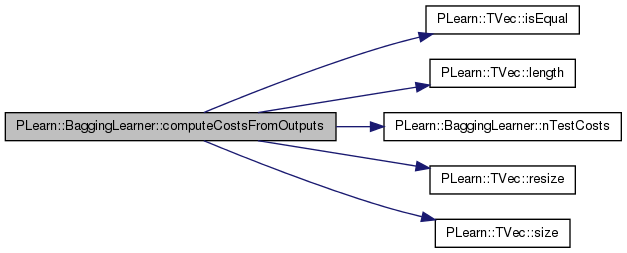
*** SUBCLASS WRITING: ***
This should be defined in subclasses to compute the output from the input.
Reimplemented from PLearn::PLearner.
Definition at line 291 of file BaggingLearner.cc.
References PLearn::TVec< T >::begin(), PLearn::TMat< T >::column(), PLearn::TVec< T >::end(), exclude_extremes, PLearn::VecStatsCollector::forget(), PLearn::StatsCollector::getStat(), PLearn::VecStatsCollector::getStats(), i, j, last_test_input, learners, learners_outputs, PLearn::TMat< T >::length(), output_sub_outputs, outputs, outputsize(), PLASSERT, PLERROR, PLearn::TMat< T >::resize(), PLearn::TVec< T >::resize(), PLearn::VecStatsCollector::size(), PLearn::TVec< T >::size(), PLearn::sortElements(), stats, stcol, PLearn::TMat< T >::subMatRows(), template_learner, PLearn::TMat< T >::toVec(), and PLearn::VecStatsCollector::update().
{
int nout = outputsize();
output.resize(nout);
int nlearners= learners.size();
PLASSERT(template_learner);
int sub_nout = template_learner->outputsize();
learners_outputs.resize(nlearners, sub_nout);
last_test_input.resize(input.size());
last_test_input << input;//save it, to test in computeCostsFromOutputs
for(int i= 0; i < nlearners; ++i)
{
Vec outp= learners_outputs(i);
learners[i]->computeOutput(input, outp);
}
if(exclude_extremes > 0)
{
outputs.resize(nlearners, sub_nout);
outputs << learners_outputs;
//exclude highest and lowest n predictions for each output
int nexcl= 2*exclude_extremes;
if(nlearners <= nexcl)
PLERROR("BaggingLearner::computeOutput : Cannot exclude all outputs! "
"nlearners=%d, exclude_extremes=%d",nlearners,exclude_extremes);
// sort all in place, one output at a time
for(int j= 0; j < sub_nout; ++j)
sortElements(outputs.column(j).toVec());
// exclude from both ends
outputs= outputs.subMatRows(exclude_extremes, outputs.length()-nexcl);
nlearners-= nexcl;
}
else
outputs= learners_outputs;
stcol.forget();
for(int i= 0; i < outputs.length(); ++i)
stcol.update(outputs(i));
int i= 0;
for(int j= 0; j < stcol.size(); ++j)
for(TVec<string>::iterator it= stats.begin();
it != stats.end(); ++it)
output[i++]= stcol.getStats(j).getStat(*it);
if(output_sub_outputs)
for(int j= 0; j < nlearners; ++j)
for(int k= 0; k < sub_nout; ++k)
output[i++]= learners_outputs(j,k);
}
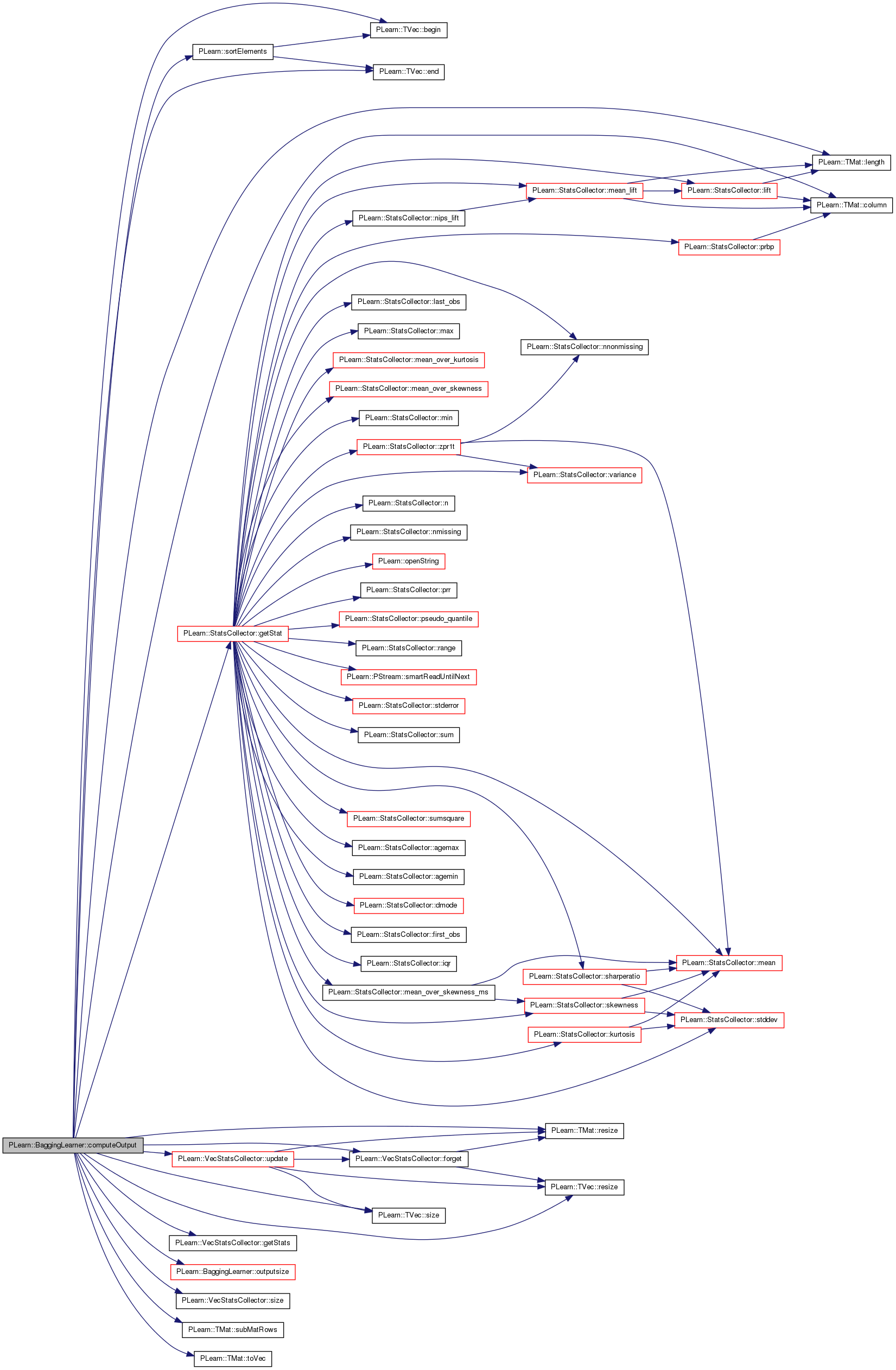
| void PLearn::BaggingLearner::declareOptions | ( | OptionList & | ol | ) | [static, protected] |
Declares this class' options.
Reimplemented from PLearn::PLearner.
Definition at line 73 of file BaggingLearner.cc.
References PLearn::OptionBase::basic_level, PLearn::OptionBase::buildoption, PLearn::declareOption(), PLearn::PLearner::declareOptions(), exclude_extremes, learners, PLearn::OptionBase::learntoption, output_sub_outputs, splitter, stats, and template_learner.
{
declareOption(ol, "splitter", &BaggingLearner::splitter,
OptionBase::buildoption,
"Splitter used to get bags. In each split, only the first set is\n"
"used (as the training set for a bag). A typical splitter used in\n"
"bagging is a BootstrapSplitter.", OptionBase::basic_level);
declareOption(ol, "template_learner", &BaggingLearner::template_learner,
OptionBase::buildoption,
"Template for all sub-learners; deep-copied once for each bag.",
OptionBase::basic_level);
declareOption(ol, "stats", &BaggingLearner::stats,
OptionBase::buildoption,
"Statistics used to combine outputs from all learners. You can use\n"
"any statistic that can be computed by a StatsCollector.",
OptionBase::basic_level);
declareOption(ol, "exclude_extremes", &BaggingLearner::exclude_extremes,
OptionBase::buildoption,
"If >0, sub-learners outputs are sorted and the exclude_extremes "
"highest and lowest are excluded.");
declareOption(ol, "output_sub_outputs", &BaggingLearner::output_sub_outputs,
OptionBase::buildoption,
"Wether computeOutput should append sub-learners outputs to output.");
declareOption(ol, "learners", &BaggingLearner::learners,
OptionBase::learntoption,
"Trained sub-learners.");
// Now call the parent class' declareOptions
inherited::declareOptions(ol);
}

| static const PPath& PLearn::BaggingLearner::declaringFile | ( | ) | [inline, static] |
Reimplemented from PLearn::PLearner.
Definition at line 106 of file BaggingLearner.h.
:
//##### Protected Options ###############################################
| BaggingLearner * PLearn::BaggingLearner::deepCopy | ( | CopiesMap & | copies | ) | const [virtual] |
Reimplemented from PLearn::PLearner.
Definition at line 58 of file BaggingLearner.cc.
| void PLearn::BaggingLearner::forget | ( | ) | [virtual] |
*** SUBCLASS WRITING: ***
(Re-)initializes the PLearner in its fresh state (that state may depend on the 'seed' option) and sets 'stage' back to 0 (this is the stage of a fresh learner!)
A typical forget() method should do the following:
This method is typically called by the build_() method, after it has finished setting up the parameters, and if it deemed useful to set or reset the learner in its fresh state. (remember build may be called after modifying options that do not necessarily require the learner to restart from a fresh state...) forget is also called by the setTrainingSet method, after calling build(), so it will generally be called TWICE during setTrainingSet!
Reimplemented from PLearn::PLearner.
Definition at line 157 of file BaggingLearner.cc.
References PLearn::PLearner::forget(), i, learners, and PLearn::TVec< T >::length().

| OptionList & PLearn::BaggingLearner::getOptionList | ( | ) | const [virtual] |
Reimplemented from PLearn::Object.
Definition at line 58 of file BaggingLearner.cc.
| OptionMap & PLearn::BaggingLearner::getOptionMap | ( | ) | const [virtual] |
Reimplemented from PLearn::Object.
Definition at line 58 of file BaggingLearner.cc.
| TVec< string > PLearn::BaggingLearner::getOutputNames | ( | ) | const [virtual] |
Returns a vector of length outputsize() containing the outputs' names.
Default version returns ["out0", "out1", ...] Don't forget name should not have space or it will cause trouble when they are saved in the file {metadatadir}/fieldnames
Reimplemented from PLearn::PLearner.
Definition at line 446 of file BaggingLearner.cc.
References addStatNames(), PLearn::TVec< T >::append(), i, j, PLearn::TVec< T >::length(), output_sub_outputs, PLASSERT, splitter, template_learner, and PLearn::tostring().
{
PLASSERT(template_learner);
PLASSERT(splitter);
TVec<string> suboutputnames= template_learner->getOutputNames();
TVec<string> outputnames= addStatNames(suboutputnames);
if(output_sub_outputs)
{
int nbags= splitter->nsplits();
int nsout= suboutputnames.length();
for(int i= 0; i < nbags; ++i)
for(int j= 0; j < nsout; ++j)
outputnames.append(string("learner")+tostring(i)+"."+suboutputnames[j]);
}
return outputnames;
}

| RemoteMethodMap & PLearn::BaggingLearner::getRemoteMethodMap | ( | ) | const [virtual] |
Reimplemented from PLearn::Object.
Definition at line 58 of file BaggingLearner.cc.
| TVec< string > PLearn::BaggingLearner::getTestCostNames | ( | ) | const [virtual] |
*** SUBCLASS WRITING: ***
This should return the names of the costs computed by computeCostsFromOutputs.
Implements PLearn::PLearner.
Definition at line 372 of file BaggingLearner.cc.
References i, j, PLearn::TVec< T >::length(), nTestCosts(), PLASSERT, splitter, template_learner, and PLearn::tostring().
{
PLASSERT(splitter);
PLASSERT(template_learner);
int nbags= splitter->nsplits();
TVec<string> subcosts= template_learner->getTestCostNames();
TVec<string> costnames(nTestCosts());
int nsubcosts= subcosts.length();
int k= 0;
for(int i= 0; i < nbags; ++i)
for(int j= 0; j < nsubcosts; ++j)
costnames[k++]= string("learner")+tostring(i)+"."+subcosts[j];
return costnames;
}

| TVec< string > PLearn::BaggingLearner::getTrainCostNames | ( | ) | const [virtual] |
*** SUBCLASS WRITING: ***
This should return the names of the objective costs that the train method computes and for which it updates the VecStatsCollector train_stats.
Implements PLearn::PLearner.
Definition at line 390 of file BaggingLearner.cc.
{
return TVec<string>(); // for now
}
| bool PLearn::BaggingLearner::isStatefulLearner | ( | ) | const [virtual] |
Does this PLearner has an internal state? Default: false.
Reimplemented from PLearn::PLearner.
Definition at line 425 of file BaggingLearner.cc.
References PLASSERT, and template_learner.
{
PLASSERT(template_learner);
return template_learner->isStatefulLearner();
}
| void PLearn::BaggingLearner::makeDeepCopyFromShallowCopy | ( | CopiesMap & | copies | ) | [virtual] |
Transforms a shallow copy into a deep copy.
Reimplemented from PLearn::PLearner.
Definition at line 127 of file BaggingLearner.cc.
References PLearn::deepCopyField(), last_test_input, learner_costs, learners, learners_outputs, PLearn::PLearner::makeDeepCopyFromShallowCopy(), outputs, splitter, stats, and template_learner.
{
inherited::makeDeepCopyFromShallowCopy(copies);
deepCopyField(splitter, copies);
deepCopyField(template_learner, copies);
deepCopyField(stats, copies);
deepCopyField(learners, copies);
deepCopyField(learners_outputs, copies);
deepCopyField(outputs, copies);
deepCopyField(learner_costs, copies);
deepCopyField(last_test_input, copies);
// TODO Do we need to deep-copy stcol?
}

| int PLearn::BaggingLearner::nTestCosts | ( | ) | const [virtual] |
Caches getTestCostNames().size() in an internal variable the first time it is called, and then returns the content of this variable.
Reimplemented from PLearn::PLearner.
Definition at line 398 of file BaggingLearner.cc.
References PLASSERT, splitter, and template_learner.
Referenced by computeCostsFromOutputs(), and getTestCostNames().
{
PLASSERT(splitter);
PLASSERT(template_learner);
return splitter->nsplits()*template_learner->nTestCosts();
}

| int PLearn::BaggingLearner::nTrainCosts | ( | ) | const [virtual] |
Caches getTrainCostNames().size() in an internal variable the first time it is called, and then returns the content of this variable.
Reimplemented from PLearn::PLearner.
Definition at line 408 of file BaggingLearner.cc.
{
return 0;
}
| int PLearn::BaggingLearner::outputsize | ( | ) | const [virtual] |
SUBCLASS WRITING: override this so that it returns the size of this learner's output, as a function of its inputsize(), targetsize() and set options.
Implements PLearn::PLearner.
Definition at line 144 of file BaggingLearner.cc.
References PLearn::TVec< T >::length(), output_sub_outputs, PLASSERT, splitter, stats, and template_learner.
Referenced by computeOutput().
{
PLASSERT(template_learner);
PLASSERT(splitter);
int sz= template_learner->outputsize() * stats.length();
if(output_sub_outputs)
sz+= template_learner->outputsize() * splitter->nsplits();
return sz;
}


| void PLearn::BaggingLearner::resetInternalState | ( | ) | [virtual] |
If any, reset the internal state Default: do nothing.
Reimplemented from PLearn::PLearner.
Definition at line 416 of file BaggingLearner.cc.
References i, learners, and PLearn::TVec< T >::length().

| void PLearn::BaggingLearner::setExperimentDirectory | ( | const PPath & | the_expdir | ) | [virtual] |
The experiment directory is the directory in which files related to this model are to be saved.
If it is an empty string, it is understood to mean that the user doesn't want any file created by this learner.
Reimplemented from PLearn::PLearner.
Definition at line 476 of file BaggingLearner.cc.
References PLearn::PLearner::setExperimentDirectory(), and template_learner.
{
inherited::setExperimentDirectory(the_expdir);
template_learner->setExperimentDirectory(the_expdir / "BaggingSubLearner");
}

| void PLearn::BaggingLearner::setTrainingSet | ( | VMat | training_set, |
| bool | call_forget = true |
||
| ) | [virtual] |
Declares the training set.
Then calls build() and forget() if necessary. Also sets this learner's inputsize_ targetsize_ weightsize_ from those of the training_set. Note: You shouldn't have to override this in subclasses, except in maybe to forward the call to an underlying learner.
Reimplemented from PLearn::PLearner.
Definition at line 434 of file BaggingLearner.cc.
References PLASSERT, PLearn::PLearner::setTrainingSet(), and template_learner.
{
PLASSERT(template_learner);
//set template learner's train set so that we can get
//output size and names (among others)
template_learner->setTrainingSet(training_set, call_forget);
inherited::setTrainingSet(training_set, call_forget);
}
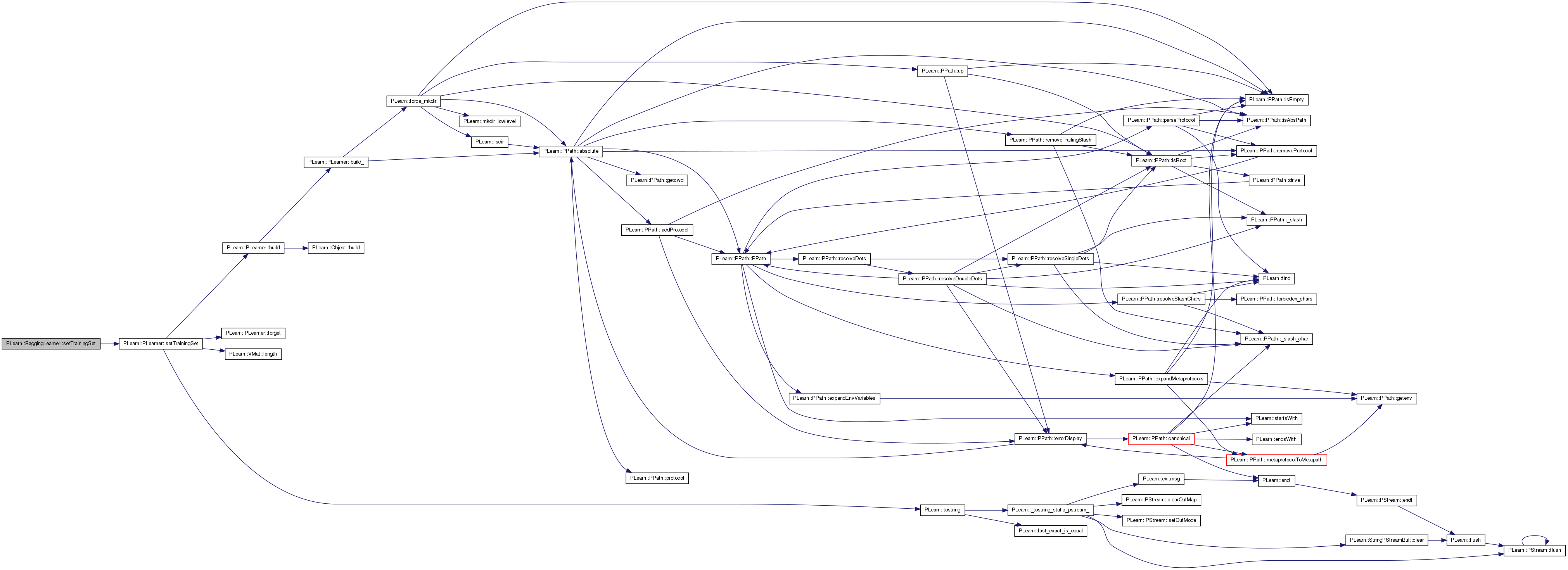
| void PLearn::BaggingLearner::setTrainStatsCollector | ( | PP< VecStatsCollector > | statscol | ) | [virtual] |
Sets the statistics collector whose update() method will be called during training.
Note: You shouldn't have to override this in subclasses, except maybe to forward the call to an underlying learner.
Reimplemented from PLearn::PLearner.
Definition at line 466 of file BaggingLearner.cc.
References PLearn::PLearner::setTrainStatsCollector(), and template_learner.
{
inherited::setTrainStatsCollector(statscol);
template_learner->setTrainStatsCollector(statscol);
}

| void PLearn::BaggingLearner::train | ( | ) | [virtual] |
*** SUBCLASS WRITING: ***
The role of the train method is to bring the learner up to stage==nstages, updating the stats with training costs measured on-line in the process.
TYPICAL CODE:
static Vec input; // static so we don't reallocate/deallocate memory each time... static Vec target; // (but be careful that static means shared!) input.resize(inputsize()); // the train_set's inputsize() target.resize(targetsize()); // the train_set's targetsize() real weight; if(!train_stats) // make a default stats collector, in case there's none train_stats = new VecStatsCollector(); if(nstages<stage) // asking to revert to a previous stage! forget(); // reset the learner to stage=0 while(stage<nstages) { // clear statistics of previous epoch train_stats->forget(); //... train for 1 stage, and update train_stats, // using train_set->getSample(input, target, weight); // and train_stats->update(train_costs) ++stage; train_stats->finalize(); // finalize statistics for this epoch }
Implements PLearn::PLearner.
Definition at line 167 of file BaggingLearner.cc.
References PLearn::PLearnService::availableServers(), c, PLearn::RemotePLearnServer::callMethod(), DBG_LOG, PLearn::endl(), PLearn::PLearnService::freeServer(), i, PLearn::PLearner::initTrain(), PLearn::PLearnService::instance(), learners, PLearn::TVec< T >::length(), PLearn::PLearner::master_sends_testset_rows, PLearn::min(), PLearn::RemotePLearnServer::newObject(), PLearn::PLearner::nservers, PLearn::PLearner::nstages, PLearn::PLearner::parallelize_here, PLASSERT, PLERROR, PLearn::PLearner::report_progress, PLearn::PLearnService::reserveServers(), PLearn::TVec< T >::resize(), PLearn::TVec< T >::size(), splitter, PLearn::PLearner::stage, template_learner, PLearn::VMat::toMat(), PLearn::PLearner::train_set, and PLearn::PLearnService::waitForResult().
{
PLASSERT(train_set);
if(!splitter)
PLERROR("BaggingLearner::train() needs a splitter.");
if(!template_learner)
PLERROR("BaggingLearner::train() needs a template learner.");
if(nstages != 1)
PLERROR("BaggingLearner.nstages should be 1 (not %d).", nstages);
if(splitter->nSetsPerSplit() != 1)
PLERROR("BaggingLearner.splitter->nSetsPerSplit() should be 1 (not %d).",
splitter->nSetsPerSplit());
splitter->setDataSet(train_set);
if (!initTrain())
return;
// init learners
int nbags= splitter->nsplits();
if(learners.size() != nbags)
{
learners.resize(nbags);
for(int i= 0; i < nbags; ++i)
{
CopiesMap c;
learners[i]= template_learner->deepCopy(c);
learners[i]->report_progress= false;
}
}
PP<ProgressBar> pb= 0;
if(report_progress)
pb= new ProgressBar("BaggingLearner::train",nbags);
PLearnService& service(PLearnService::instance());
int nservers= min(nbags, service.availableServers());
if(nservers > 1 && parallelize_here)//parallel train
{
TVec<PP<RemotePLearnServer> > servers= service.reserveServers(nservers);
nservers= servers.length();
map<PP<RemotePLearnServer>, int> learners_ids;
map<PP<RemotePLearnServer>, int> bagnums;
map<PP<RemotePLearnServer>, int> step;
for(int i= 0; i < nservers; ++i)
{
RemotePLearnServer* s= servers[i];
int id= s->newObject(*learners[i]);
VMat sts= splitter->getSplit(i)[0];
if(master_sends_testset_rows)
sts= new MemoryVMatrix(sts.toMat());
s->callMethod(id, "setTrainingSet", sts, true);
learners_ids[s]= id;
bagnums[s]= i;
step[s]= 1;
}
int lastbag= nservers-1;
int ndone= 0;
while(nservers > 0)
{
PP<RemotePLearnServer> s= service.waitForResult();
switch(step[s])
{
case 1:
DBG_LOG << "** get setTrainingSet result" << endl;
s->getResults();//from setTrainingSet
s->callMethod(learners_ids[s], "train");
step[s]= 2;
break;
case 2:
DBG_LOG << "** get train result" << endl;
s->getResults();//from train
if(pb) pb->update(++ndone);
s->callMethod(learners_ids[s], "getObject");
step[s]= 3;
break;
case 3:
DBG_LOG << "** get getObject result" << endl;
s->getResults(learners[bagnums[s]]);//from getObject
s->deleteObject(learners_ids[s]);
if(++lastbag < nbags)
{
int id= s->newObject(*learners[lastbag]);
VMat sts= splitter->getSplit(lastbag)[0];
if(master_sends_testset_rows)
sts= new MemoryVMatrix(sts.toMat());
s->callMethod(id, "setTrainingSet", sts, true);
learners_ids[s]= id;
bagnums[s]= lastbag;
step[s]= 1;
}
else
{
service.freeServer(s);
--nservers;
}
break;
}
}
return; // avoid extra indentation
}
// sequential train
for(int i= 0; i < nbags; ++i)
{
PP<PLearner> l = learners[i];
l->setTrainingSet(splitter->getSplit(i)[0]);
l->train();
if(pb) pb->update(i);
}
stage++;
PLASSERT( stage == 1 );
}
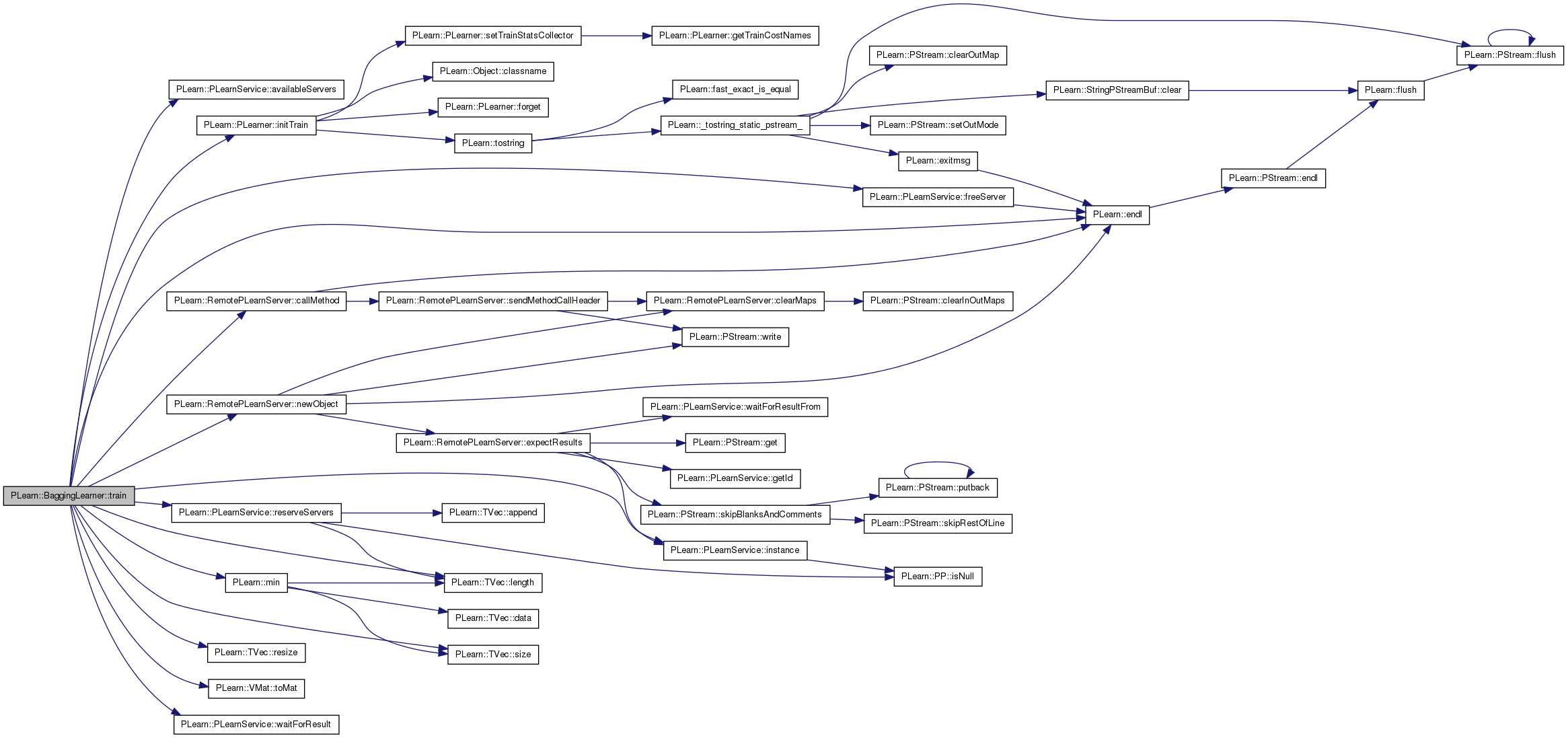
Reimplemented from PLearn::PLearner.
Definition at line 106 of file BaggingLearner.h.
for computeOutput: remove the highest and lowest outputs before averaging (nb.
to exclude at each end)
Definition at line 64 of file BaggingLearner.h.
Referenced by computeOutput(), and declareOptions().
Vec PLearn::BaggingLearner::last_test_input [mutable, protected] |
Definition at line 137 of file BaggingLearner.h.
Referenced by computeCostsFromOutputs(), computeOutput(), and makeDeepCopyFromShallowCopy().
Vec PLearn::BaggingLearner::learner_costs [mutable, protected] |
Definition at line 136 of file BaggingLearner.h.
Referenced by makeDeepCopyFromShallowCopy().
TVec<PP<PLearner> > PLearn::BaggingLearner::learners [protected] |
Definition at line 117 of file BaggingLearner.h.
Referenced by computeCostsFromOutputs(), computeOutput(), declareOptions(), forget(), makeDeepCopyFromShallowCopy(), resetInternalState(), and train().
Mat PLearn::BaggingLearner::learners_outputs [mutable, protected] |
Definition at line 134 of file BaggingLearner.h.
Referenced by computeCostsFromOutputs(), computeOutput(), and makeDeepCopyFromShallowCopy().
Wether computeOutput should append sub-learners outputs to output.
Definition at line 66 of file BaggingLearner.h.
Referenced by computeOutput(), declareOptions(), getOutputNames(), and outputsize().
Mat PLearn::BaggingLearner::outputs [mutable, protected] |
Definition at line 135 of file BaggingLearner.h.
Referenced by computeOutput(), and makeDeepCopyFromShallowCopy().
splitter used to get bags(=splits)
Definition at line 58 of file BaggingLearner.h.
Referenced by declareOptions(), getOutputNames(), getTestCostNames(), makeDeepCopyFromShallowCopy(), nTestCosts(), outputsize(), and train().
| TVec<string> PLearn::BaggingLearner::stats |
functions used to combine outputs from all learners
Definition at line 61 of file BaggingLearner.h.
Referenced by addStatNames(), computeOutput(), declareOptions(), makeDeepCopyFromShallowCopy(), and outputsize().
VecStatsCollector PLearn::BaggingLearner::stcol [mutable, protected] |
Definition at line 133 of file BaggingLearner.h.
Referenced by computeOutput().
to deep-copy once for each bag
Definition at line 59 of file BaggingLearner.h.
Referenced by computeOutput(), declareOptions(), getOutputNames(), getTestCostNames(), isStatefulLearner(), makeDeepCopyFromShallowCopy(), nTestCosts(), outputsize(), setExperimentDirectory(), setTrainingSet(), setTrainStatsCollector(), and train().
 1.7.4
1.7.4